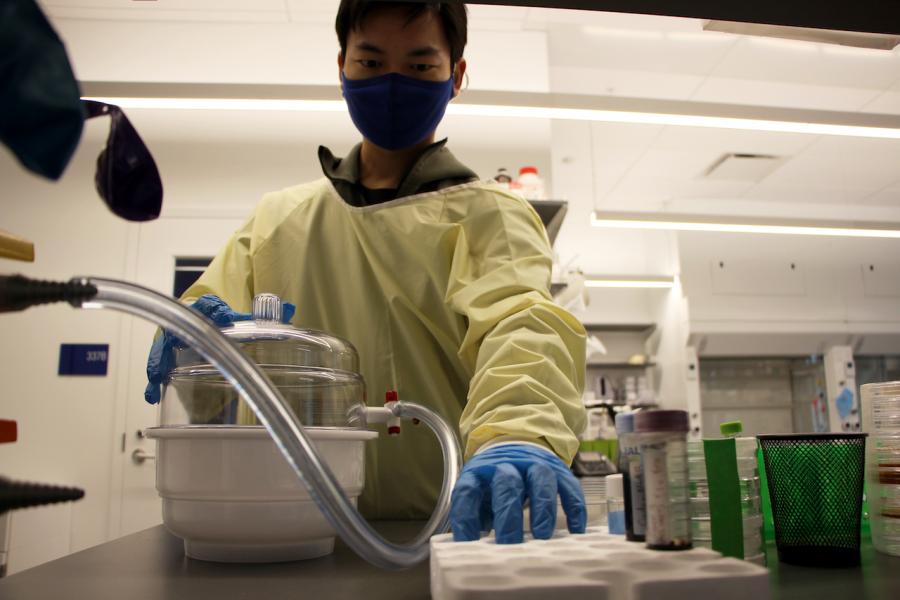Highlighting Musah Lab and PhD student, George Mou
By Brittany Vekstein

Xingrui (George) Mou is a second-year PhD student at Duke University working in the Musah Lab, led by Samira Musah, PhD, assistant professor in the department of biomedical engineering, medicine and cell biology, and an investigator for Duke MEDx. He has been working in Dr. Musah’s lab since November 2018.
Mou is originally from Chengdu, China, and received his bachelor of engineering degree from Southwest Jiaotong University. Most recently he has been here in the United States at Duke University where he received his master of science in biomedical engineering degree and is currently pursuing his PhD in biomedical engineering. Mou is working towards a career in biomedical engineering where he will design and engineer more physiologically relevant models that can mimic the structure and physiology of the human kidneys – with hopes to allow researchers to study various kidney diseases.
Southwest Jiaotong University. Most recently he has been here in the United States at Duke University where he received his master of science in biomedical engineering degree and is currently pursuing his PhD in biomedical engineering. Mou is working towards a career in biomedical engineering where he will design and engineer more physiologically relevant models that can mimic the structure and physiology of the human kidneys – with hopes to allow researchers to study various kidney diseases.
Recently, Mou was awarded, for the second time, the International Foundation for Ethical Research (IFER) Fellowship. This fellowship provides one-year support to students who make efforts to reduce, refine or replace the use of animals in the science community. IFER invests in opportunities that are inspired by the potential of 21st century technologies and provides incentives to researchers to pursue answers to today’s questions in science without causing harm to animals.
Current Research
Mou is currently working on a research project to develop a biodegradable membrane-based organ-on-chip system that recapitulates the structure and function of the human kidney glomerulus. The chip system is composed of microfluidic channels that is separated by a biodegradable membrane, and the channels model the glomerular capillary and the Bowman’s capsule by incorporating specific kidney cells in a way that mimics the cellular compartment and structural characteristics of the glomerular filtration barrier. Overtime, the biodegradable membrane will be degraded and remodeled by the kidney cells to form their own glomerular basement membrane, and the overall glomerular filtration barrier in the chip will serve as a physiologically relevant model to study the disease of the human kidney glomerulus, providing researchers insight into the function and disease mechanisms.
“I am very honored to be part of this fellowship because it helps me to pursue my goal of engineering the in vitro human kidney glomerulus-on-chip system, which will serve as an alternative platform for researchers to study kidney disease without the use of animal models” - George Mou
“I am very honored to be part of this fellowship because it helps me to pursue my goal of engineering the in vitro human kidney glomerulus-on-chip system, which will serve as an alternative platform for researchers to study kidney disease without the use of animal models” said Mou. “[The fellowship program] motivates me to learn more about ethical issues of using animals in the science community and knowing that most people don’t feel very comfortable sacrificing animals makes me more determined to pursue my goal.”
While animal models, such as mice and rats, have been traditionally used in research and they have contributed to significant advancement in our understanding of human biology and disease, there have been ethical issues, and physiological pathways in animals that do not necessarily represent humans. Mou and others are seeking to develop alternative platforms to animal models for studying human diseases.
"We are grateful to IFER for supporting our work on developing stem cell-based microfluidic organ-on-chips systems to model human diseases. We also appreciate their support of George Mou's PhD training. He is a remarkable student who truly deserves this honor" Dr. Musah said.
Mou and his colleagues, so far, have seen promising preliminary results and the team of investigators will be gathering experiment results for a future manuscript.
Learn more about the IFER Fellowship program

